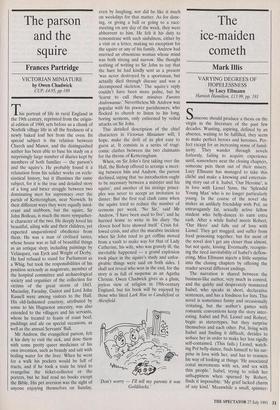The parson and the squire
Frances Partridge
VICTORIAN MINIATURE by Owen Chadwick CUP, £4.95, pp 189 This portrait of life in rural England in the 19th century, reprinted from the origin- al edition of 1960, sets before us a chunk of Norfolk village life in all the freshness of a newly baked loaf hot from the oven. Its special subject is the relation between Church and Manor, and the distinguished author has been able to base his study on a surprisingly large number of diaries kept by members of both families — the parson's and the squire's. He probably found it a relaxation from his solider works on eccle- siastical history, but it illumines the same subject, for it is the true and detailed story of a long and bitter struggle between two dominating men for supremacy over the parish of Ketteringham, near Norwich. In their different ways they were equally intol- erant and stubborn, but the squire, Sir John Boileau, is much the more sympathet- ic character of the two. He deeply loved his beautiful, ailing wife and their children, yet expected unquestioned obedience from them, He was a man of civilised tastes, whose house was as full of beautiful things as an antique shop, including paintings by Velasquez, van Eyck and Wright of Derby. He had refused to stand for Parliament as a Whig, but took the responsibilities of his position seriously as magistrate, member of the hospital committee and archaeological society and organiser of the collection for victims of the great storm of 1843. Macaulay, Faraday, Guizot and Lord John Russell were among visitors to the Hall. His old-fashioned courtesy, attributed by some to his Huguenot ancestry, was also extended to the villagers and his servants, whom he treated to feasts of roast beef, puddings and ale on special occasions, as well as the annual Servants' Ball.
Mr Andrew, the evangelical parson, felt it his duty to visit the sick, and dose them with some pretty queer medicines of his own invention, such as brandy and salt with boiling water for the liver. When he went for a walk his pockets would be full of tracts, and if he took a train he tried to evangelise the ticket-collector or the porters, but he had read no books except the Bible. His pet aversion was the sight of anyone enjoying themselves on Sunday, even by laughing, nor did he like it much on weekdays for that matter. As for danc- ing, or giving a ball or going to a race- meeting on any day of the week, they were abhorrent to him. He felt it his duty to remonstrate with such sinfulness, either by a visit or a letter, making no exception for the squire or any of his family. Andrew had married an obnoxious woman whose mind was both strong and narrow. She thought nothing of writing to Sir John to say that the hare he had kindly sent as a present `was never destroyed by a sportsman, but actually died through disease and was a decomposed skeleton.' The squire's reply couldn't have been more polite, but he `learnt to call these missives Furores Andrewanae.' Nevertheless Mr Andrew was popular with his poorer parishioners, who flocked to church to listen to his long, boring sermons, only enlivened by veiled attacks on Sir John.
This detailed description of the chief characters in Victorian Miniature will, I hope, make the drift of its plot easy to guess at. It consists in a series of tragi- comic clashes between the two claimants for the throne of Ketteringham.
When, on Sir John's first taking over the Hall, the Bishop offered to arrange a meet- ing between him and Andrew, the parson declined, saying that `no introduction ought to be necessary between a minister and his squire', and another of his strange princi- ples was never to accept an invitation to dinner. But the first real clash came when the squire tried to reduce the number of sermons per week. 'No Sir,' said Mr Andrew, 'I have been used to five'; and he hurried home to write in his diary 'the cloven hoof here showed itself.' Crisis fol- lowed crisis, and after the macabre incident when Sir John tried to get coffins moved from a vault to make way for that of Lady Catherine, his wife, who was gravely ill, the inevitable happened — a grand explosion took place in the squire's study and unfor- givable things were said on both sides. I shall not reveal who won in the end, for the story is as full of suspense as an Agatha Christie. Owen Chadwick gives us a glum, joyless view of religion in 19th-century England, but his book will be enjoyed by those who liked Lark Rise to Candleford or Akenfield.
`Don't worry — I'll tell my parents it was Goldilocks.'


















































 Previous page
Previous page